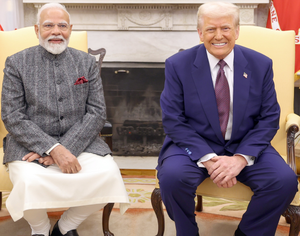
New Delhi — US President Donald Trump, following a failed push for a ceasefire in Ukraine, is now pursuing a broader strategy aimed at tightening economic pressure on Moscow — this time by targeting Russia’s energy exports.
Central to this effort, Trump has invoked his “good friend,” Indian Prime Minister Narendra Modi, urging New Delhi to scale back its purchases of Russian oil.
Despite the US imposing “reciprocal” trade tariffs on India, Trump has been increasingly vocal about New Delhi’s continued imports of discounted Russian crude. Washington views this trade as undercutting global sanctions and weakening the economic isolation intended to force Russian President Vladimir Putin to the negotiating table.
Two key concerns are shaping the US approach: first, that sanctions have pushed Russian trade away from the US dollar, and second, that continued Indian oil imports from Russia deprive the US of potential energy export markets.
Responding to the issue, MEA Spokesperson Randhir Jaiswal reaffirmed India’s long-standing energy priorities: “India is a significant importer of oil and gas, and ensuring stable energy prices and secured supplies have been the twin goals of our energy policy,” he said.
He added that India has worked to expand energy cooperation with the United States over the past decade. “Discussions are ongoing,” Jaiswal noted, pointing to a steady deepening of bilateral engagement.
Even within the US, some Russian oil has reportedly slipped through embargo loopholes since the import ban began in March 2022 — a situation the White House has been working to address.
Trump has also criticised some NATO allies for continuing to rely on Russian energy, accusing them of “funding the war against themselves.” Last month, he called on European leaders to completely halt Russian oil imports and proposed a “Coalition of the Willing” led by French President Emmanuel Macron to pressure Moscow.
Although many European countries reduced their dependence on Russian energy after 2022, nations such as Slovakia and Hungary have maintained partial imports. The European Commission has since proposed phasing out all Russian energy imports by January 1, 2028.
Acknowledging India’s position, Trump conceded that New Delhi could not immediately stop buying Russian oil. However, he claimed that Modi had assured him of progress, saying, “It’s a little bit of a process, but that process will be over soon.”
After Russia’s invasion of Ukraine in February 2022, Moscow redirected major crude shipments from Europe to Asia, particularly to China and India. India’s purchases surged as refiners took advantage of steep discounts, making it one of Russia’s largest oil buyers by 2023–2024.
While Trump has refrained from similar criticism of China, despite threatening a 100 per cent tariff, he hinted at plans to pressure Beijing as well. “Now we’re going to get China to do the same thing,” he said, suggesting that further talks could take place when he meets Chinese Premier Xi Jinping during the APEC summit in South Korea later this year.
For Trump, invoking his close ties with Modi serves a dual purpose — to project diplomatic influence and to claim progress on foreign policy. By linking personal rapport to geopolitical leverage, the US President is attempting to showcase leadership on global security while signalling renewed determination to broker peace in Ukraine.
With inputs from IANS